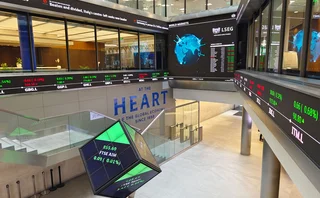
OTC client clearer of the year: Citi
Risk Awards 2017: FCM makes its voice heard as business booms

The US swaps clearing business is becoming more concentrated. While the market grew robustly in 2016 – from $64 billion at the end of January to $81 billion by the end of October, as measured by total client over-the-counter swap margin – the year ended with a slightly larger share in the hands of the top five futures commission merchants (FCMs).
So it is important for those FCMs to take their responsibilities seriously – to their clients, the clearing system as a whole and their shareholders. Citi did exactly that last year, winning lavish praise from customers, speaking up on contentious topics and delivering impressive revenue growth. By the end of October, the bank had the largest share of the market's cleared swap client margin – just under $14 billion – having grown 82% from $7.7 billion at the end of January.
"We are very much focused on the sustainability of our clearing business model, focused on sustained growth and remaining a thought leader in the industry," says Jerome Kemp, global head of futures, clearing and collateral at Citi in London. "Last year was a good one for us; as of year-end, we had cleared $69.2 trillion in gross notional equivalent in swaps, and $226.5 trillion since we began clearing five years ago. In addition, OTC derivatives clearing revenues have increased by more than 40% and overall cleared swap volumes have increased by approximately 30% this year."
Citi's growth is partly a reflection of the regulatory pressures facing FCMs in the form of higher capital requirements. It was the first to realise that passing interest earned on client margin directly to the customer would remove that margin from the bank's own exposure total for the purposes of the Basel III leverage ratio; others have been slower to act or lack the scale to make the business attractive. Stronger FCMs have been able to capitalise.
"We are certainly seeing a general retraction of service providers in clearing and we are now consolidating our providers down to a smaller number," says a source at one asset manager. "Citi was the first on our list when we did that review. They remain our strongest clearing broker of the three we use."
I think Citi is the poster child of what an FCM should be. Right now, there are a lot of changing seats among those who don't want to be in the FCM space. Citi is stable and they are firmly committed to the business
Director of trading at a US hedge fund
As a director of trading at one US hedge fund puts it: "I think Citi is the poster child of what an FCM should be. Right now, there are a lot of changing seats among those who don't want to be in the FCM space. Citi is stable and they are firmly committed to the business."
The Commodity Futures Trading Commission records only 20 FCMs as being active in client over-the-counter clearing at the end of 2016, of which only 11 had more than $1 billion in client margin. The total held by the top five FCMs stood at 58.2% in October, up from 42.7% in January.
Citi has also distinguished itself in the past 12 months through its advocacy on issues affecting FCMs and the clearing sector in general.
Perhaps no issue energised the FCM community in 2016 as much as the hefty intraday margin calls issued by central counterparties (CCPs) in the two trading days immediately after the UK's referendum on membership of the European Union. LCH took the most heat for sticking with its long-standing practice of calling for top-up margin three times a day – known as a ‘market data refresh' (MDR) – to cover moving markets, followed by a variation margin call the next morning.

We are very much focused on the sustainability of our clearing business model, focused on sustained growth and remaining a thought leader in the industry
Jerome Kemp, Citi
FCMs have long complained these calls are duplicative since a member could be obliged to post margin for the same move twice, but opposition came to a head after the vote, when sharp yield-curve moves resulted in aggregate margin calls of up to $40 billion across the various clearing houses. In the aftermath, a working group was established by the FIA, the futures industry body, to seek changes to LCH's margin methodology for interest rate swaps.
Citi played a key role in the FIA working group, advocating for LCH to move up the timing of its third MDR to 5pm London time to allow the collateral to be invested in repo markets that evening, speeding up the time taken to return the margin back to FCMs by a day. The other concession secured by the working group was a change in LCH's procedures to allow unallocated excess collateral sitting at the clearing house to be used to meet intraday margin calls.
Despite the reform commitments, Citi says actual change has been slow.
"I would say progress has been disappointingly slow in terms of changes to margin methodologies and the triple-dipping that resulted in something of a liquidity squeeze during Brexit. That methodology has now been changed to just double-dipping, which, quite frankly, is not a solution. We should not be under any delusions that this is a good outcome, so there has been disappointingly slow progress here and we hope for some more dynamic engagement in 2017," Kemp says.
We want ‘defaulter pays', we want the margin to work during a period of stress, and we do not want other people paying for somebody else's risk
Christopher Perkins, Citi
LCH was selected as Risk's Clearing house of the year, largely because of this debate.
Citi's campaigning extended to products for which clearing is not yet mandatory, in the hope of ironing out any problems before regulators impose a requirement on the market. One example is in foreign exchange, where cleared non-deliverable forward (NDF) volumes have spiked markedly since the introduction of non-cleared margin requirements on dealer-to-dealer trades since September 1.
Among the issues Citi identified is the ratio between initial margin and default fund contributions on LCH's ForexClear platform. All clearing participants contribute to the former, but only members to the latter, making it a key component in the ‘defaulter pays' model espoused by most CCPs and member firms.
The clearing service is currently operating with a default fund-to-initial margin ratio of 30–40%, according to Citi, meaning too much of the tail risk is being borne by clearing members. Among the possible consequences is the inability to port positions from a defaulting member firm to survivors, because other members would need to sink even more into the fund. In a mature cleared product, the ratio should be closer to 5%, says Citi.
"We are saying initial margin should mitigate the vast preponderance of the risk and the guarantee fund should be there to cover the tail risk," says Christopher Perkins, global head of OTC clearing at Citi in New York. "We want ‘defaulter pays', we want the margin to work during a period of stress, and we do not want other people paying for somebody else's risk."
LCH declined to provide an official comment for this article, but one counter-argument is that the ratio depends in large part on the number of active clearing members and the number of clients with directional positions – the latter being responsible for the bulk of the initial margin total.
Currently, ForexClear only has 24 members, compared with the 104 clearing client trades at SwapClear. As more firms sign up to the service, bringing in more clients, the ratio ought to drop, but Perkins calls for "adjustments to initial margin and skin in the game where the CCPs may imbed some more thoughtful stresses, making the relationship between initial margin, skin in the game and the guarantee fund more balanced".
Growth source
One of the most eye-catching sources of growth at Citi last year was a 15-fold increase in cleared, single-name credit derivatives notionals. The drivers are varied; for example, credit is one of the most painful asset classes for an FCM to handle, as it generates higher exposure totals, prompting some banks to ‘offboard' credit funds.
The introduction of initial margin requirements for non-cleared interdealer derivatives trades in the US on September 1 has also added impetus to the business, but only after Citi cooked up a response to one of the problems accompanying the regime.
Historically, a buy-side firm looking to step out of a trade would simply arrange for another dealer to step in and face its original counterparty. The introduction of initial margin requirements for interdealer trades has made such novations drastically more expensive. When the new dealer steps into the trade, the two dealer parties now have to post margin to each other – a cost being passed on to the buy-side firm.
To ameliorate those margin costs, Citi proposed a novel solution to its buy-side clients. Rather than novating trades, clients are instead backloading them into a CCP – thereby facing the clearing house rather than the original counterparty – and then entering into a new offsetting bilateral swap that flattens the risk. Of course, the client needs to post margin on its cleared trades, but some firms prefer this to the cost of novating in the non-cleared world.
The approach has enticed some clients to execute their first cleared CDS trades.
Citi's commitment to the credit derivatives asset class is also borne out by the breadth of its coverage. A popular trade during 2016 was to exploit pricing mismatches between CDS indexes and their 125 single-name constituents – an attractive arrangement for FCMs too, since the clearer would collect a commission on the index trade, as well as each of the constituents when putting the trade on, and again when unwinding it. Citi says the total clearing revenues associated with such an arbitrage position could amount to $50,000 for a trade with little risk.
To be able to put on the trade for a customer, however, an FCM needs the ability to clear all of the index constituents.
"Some FCMs don't support single-name CDS clearing or they do not support clearing all of the constituent names in the index. To be viable in CDS you need to have an institutional commitment to the product, because end-of-day pricing is required from the desk. Citi can clear the entire suite of corporate single-name CDS to accompany the index when that arbitrage trade emerges. That is unique to us and only a couple of other FCMs," says Perkins.
Only users who have a paid subscription or are part of a corporate subscription are able to print or copy content.
To access these options, along with all other subscription benefits, please contact info@risk.net or view our subscription options here: http://subscriptions.risk.net/subscribe
You are currently unable to print this content. Please contact info@risk.net to find out more.
You are currently unable to copy this content. Please contact info@risk.net to find out more.
Copyright Infopro Digital Limited. All rights reserved.
As outlined in our terms and conditions, https://www.infopro-digital.com/terms-and-conditions/subscriptions/ (point 2.4), printing is limited to a single copy.
If you would like to purchase additional rights please email info@risk.net
Copyright Infopro Digital Limited. All rights reserved.
You may share this content using our article tools. As outlined in our terms and conditions, https://www.infopro-digital.com/terms-and-conditions/subscriptions/ (clause 2.4), an Authorised User may only make one copy of the materials for their own personal use. You must also comply with the restrictions in clause 2.5.
If you would like to purchase additional rights please email info@risk.net
More on Awards
Clearing house of the year: LCH
Risk Awards 2025: LCH outshines rivals in its commitment to innovation and co-operation with clearing members
Best use of machine learning/AI: CompatibL
CompatibL won Best use of machine learning/AI at the 2025 Risk Markets Technology Awards for its use of LLMs for automated trade entry, redefining speed and reliability in what-if analytics
Markets Technology Awards 2025 winners’ review
Vendors jockeying for position in this year’s MTAs, as banks and regulators take aim at counterparty blind spots
Equity derivatives house of the year: Bank of America
Risk Awards 2025: Bank gains plaudits – and profits – with enhanced product range, including new variants of short-vol structures and equity dispersion
Law firm of the year: Linklaters
Risk Awards 2025: Law firm’s work helped buttress markets for credit derivatives, clearing and digital assets
Derivatives house of the year: UBS
Risk Awards 2025: Mega-merger expected to add $1 billion to markets revenues, via 30 integration projects
Interest rate derivatives house of the year: JP Morgan
Risk Awards 2025: Steepener hedges and Spire novations helped clients navigate shifting rates regime
Currency derivatives house of the year: UBS
Risk Awards 2025: Access to wealth management client base helped Swiss bank to recycle volatility and provide accurate pricing for a range of FX structures







